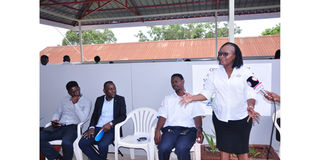Prime
KCCA overwhelmed by demand for immunisations in Kampala

Dr Sarah Zalwanga, deputy director medical services at KCCA, addresses health workers and ACODEV officials at Kawaala Health Centre IV on April 12, 2024. PHOTO | NOELINE NABUKENYA
What you need to know:
- The surge in demand has led to occasional shortages of medical supplies and stressed infrastructure. Dr Zalwango noted that KCCA registers 3,000-3,500 expectant mothers monthly, directly impacting the number of babies requiring immunisations.
Kampala Capital City Authority (KCCA) is facing an overwhelming number of children seeking immunizations, straining their limited resources and infrastructure.
Dr Sarah Zalwango, KCCA's Deputy Director of Medical Services, reported that the Kawala health facility alone receives at least 4,000 babies for immunisations every month. The facility sees an average of 900-1,000 patients daily.
The surge in demand has led to occasional shortages of medical supplies and stressed infrastructure. Dr Zalwango noted that KCCA registers 3,000-3,500 expectant mothers monthly, directly impacting the number of babies requiring immunisations.
“This facility is very crucial to the community of Rubaga Division and Kampala at large yet the budget for KCCA is not sufficient to meet the demands of the patients,” Dr Zalwango said.
She made the remarks on Friday, during the handover of medical supplies and consumables and a newly constructed immunisation shed for babies.
The donation was made by Action for Community Development (ACODEV), in partnership with Local Coalition Accelerator (LCA).
This publication has learnt that the initial donation to this health facility was only medical supplies but upon reaching out to KCCA, they realised there was a pressing issue of lack of an immunisation shed.

The newly constructed immunization shed for babies that has the capacity to accommodate 40 mothers at ago. PHOTO | NOELINE NABUKENYA
The previous dilapidated tent posed a risk of collapsing during rain and offered limited, muddy space.
Dr Paddric Nyanzi, the health facility's officer in charge, expressed gratitude to ACODEV for their generosity. He emphasized the ongoing challenge of limited medical supplies due to the high patient volume. Dr. Nyanzi revealed that the facility has witnessed a doubling of patients compared to the past two years.
“We have an overwhelming number of patients at our facility because it is the immediate facility for people from Rubaga and Wakiso,” Dr Nyanzi said.
Mr Paul Okiring, the Executive Directive of Acodev, said their objective is to change the lives of Ugandans through community development projects.
He said the immunisation shed is one of the small projects they have done but recently they have invested in a lot of multi-billion projects.
Mr Vincent Nsereko, the chairperson of Local Coalition Accelerator, an association that brings together humanitarian organisations, said they wanted to start with the shed.
“The ground was just bare earth and whenever it would rain, the place would flood and almost be unusable. We have set up a semi-permanent shed, paved the place so that whether it is raining or shining, the place is well aerated,” Mr Nsereko said.




